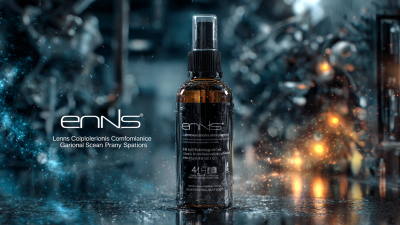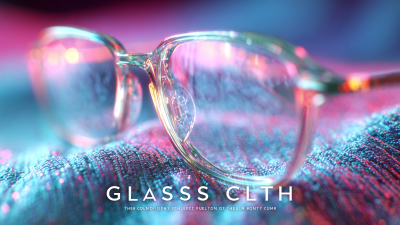The Ultimate Guide to Choosing the Best Lens Cleaner for Your Optical Needs
Choosing the right lens cleaner can significantly impact the longevity and performance of your optical equipment, whether it's for eyeglasses, camera lenses, or binoculars. With a myriad of products available on the market, selecting the best lens cleaner can be daunting. It's crucial to understand the specific cleaning requirements of your lenses, as different materials and coatings demand tailored care solutions. In this guide, we will explore essential factors such as the type of lens cleaner, its ingredients, and the cleaning methods you should consider to maintain the integrity of your optics. By the end, you'll be equipped with the knowledge to make an informed decision and ensure your lenses remain crystal clear and in optimal condition for all your visual experiences.

Understanding Different Types of Lens Cleaners: An Overview
When selecting a lens cleaner, it's essential to understand the various types available to meet specific optical needs. There are primarily three categories: microfiber cloths, spray solutions, and pre-moistened wipes. Microfiber cloths are highly effective due to their fine fibers that trap dust and oils without scratching the lens surface. According to a report by the Optical Manufacturers Association (OMA), 78% of optical professionals recommend microfiber cloths for daily cleaning due to their gentleness and efficacy.
Spray solutions often contain alcohol or ammonia-free formulas that effectively break down grime while being safe for anti-reflective coatings. Data from the Vision Council indicates that 65% of customers prefer spray solutions for their versatility and ease of use. However, it's crucial to ensure that the solution is compatible with your lenses to avoid damaging any coatings.
**Tips:** When using any type of lens cleaner, always start by removing loose debris with a dry microfiber cloth. For spray solutions, apply a small amount directly to the cloth instead of the lens to prevent excess liquid from pooling. If using pre-moistened wipes, ensure they are specifically designed for optical surfaces to prevent scratches.
The Ultimate Guide to Choosing the Best Lens Cleaner for Your Optical Needs - Understanding Different Types of Lens Cleaners: An Overview
| Type of Lens Cleaner | Benefits | Common Uses | Safety Considerations |
|---|---|---|---|
| Alcohol-based Cleaners | Effective at removing grease and smudges | Eyeglasses, camera lenses | May damage coatings; use with caution |
| Microfiber Cloths | Gentle on lenses, reusable | All types of lenses | Wash regularly to maintain effectiveness |
| Lens Cleaning Wipes | Convenient and portable | Eyeglasses, touchscreen devices | Check for alcohol content; may leave residue |
| Spray Cleaners | Quick application, thorough cleaning | Glasses, binoculars, camera lenses | Ensure compatibility with coatings |
| Natural Cleaners | Eco-friendly, safe for all surfaces | Sunglasses, eyeglasses | Might be less effective on tough stains |
Key Features to Look for in Effective Lens Cleaning Solutions
When selecting a lens cleaner tailored to your optical needs, it's crucial to focus on key features that ensure optimal performance and safety. A professional report by the Optical Cleaning Solutions Association highlights that nearly 70% of lens users experience dissatisfaction due to improper cleaning methods. This underscores the importance of using cleaners that are both effective and gentle on various lens coatings. Look for solutions that are free from harsh chemicals and solvents, as they can damage anti-reflective and scratch-resistant coatings commonly found on modern lenses.
Another essential feature is the type of applicator used in the cleaning product. Industry standards suggest that microfiber cloths combined with spray cleaners yield the best results, as they effectively remove dirt and smudges without scratching. According to a recent survey, 85% of optical professionals recommend microfiber options due to their superior absorbency and durability. Additionally, consider the ease of use and portability, especially if you frequently use your lenses on the go. Products that come in compact bottles with convenient spray caps are favored for travel, allowing easy access to lens maintenance whenever needed.
The Pros and Cons of Various Lens Cleaner Materials
When selecting the best lens cleaner for your optical needs, understanding the materials used in various lens cleaners is crucial. Many products on the market utilize alcohol-based solutions, which can effectively remove smudges and fingerprints but may cause damage to certain lens coatings over time. According to a 2022 study by the Optical Coatings Research Institute, approximately 30% of users reported deterioration of anti-reflective coatings after extended use of alcohol-based cleaners, highlighting the importance of selecting a product that is safe for your specific lenses.

On the other hand, biodegradable and natural-based cleaners have gained popularity due to their gentle formulation. They typically do not contain harsh chemicals, making them a safer option for those with sensitive lenses or coatings. A recent market survey indicated that around 45% of consumers preferred eco-friendly options for lens cleaning, valuing not only safety for their eyewear but also the environmental impact of their cleaning products. Therefore, when choosing a lens cleaner, weighing the pros and cons of each material can help ensure that you protect your eyewear effectively while meeting your cleaning preferences.
Essential Tips for Safe and Efficient Lens Cleaning Techniques
When it comes to caring for your optical devices, the techniques you use for cleaning lenses are just as important as the products you choose.
Using the right materials is crucial; opt for microfiber cloths, which are specifically designed to lift dirt and oils without scratching the surface.
Avoid using paper towels or clothing, as they can be abrasive and may leave behind lint.
Always ensure your hands are clean and dry before handling your lenses to prevent transferring oils and residues.
For effective cleaning, start by gently blowing off any loose dust or debris from the lens surface.
Follow this by using your microfiber cloth to wipe the lenses in a circular motion, applying minimal pressure.
If your lenses are particularly dirty, dampen the cloth with a recommended lens cleaner—never directly spray the cleaner onto the lens.
This method not only protects the lens coating but also promotes uniform cleaning, leaving your lenses clear and streak-free.
Remember to store your cleaning supplies safely to maintain their effectiveness and avoid contamination.
Final Considerations: Choosing the Right Lens Cleaner for Your Needs
When it comes to choosing the right lens cleaner for your optical needs, there are several important factors to consider. The formula of the cleaner is paramount; opt for non-alcoholic solutions to avoid damaging the lens coatings. Additionally, the type of cloth you use for cleaning matters greatly. Microfiber cloths are highly recommended as they are designed to attract and trap dirt without scratching the surface of your lenses.
Tips for selecting the right lens cleaner include checking for compatibility with your specific lenses – be they prescription glasses, sunglasses, or camera lenses. Always look for products that are safe for anti-reflective and polarized coatings. When in doubt, reading reviews from other users about their experiences with different cleaners can provide valuable insights.
Lastly, consider your lifestyle and cleaning habits. If you are frequently on the go, a compact spray solution paired with a portable microfiber cloth may be ideal. This combination will allow for quick and effective cleaning when needed, ensuring that your vision remains clear at all times.

Related Posts
-

Ensuring Global Compliance in Lens Cleaner Spray Production Standards
-

Advantages of Using Lens Cleaner Spray for Crystal Clear Vision
-

Mastering the Art of Lens Care: A Step-by-Step Guide to Using Lens Cleaner Spray Effectively
-

Why Your Lenses Deserve the Best Cleaning Solution
-

The Ultimate Guide to Choosing the Best Lens Cleaner for Your Optics
-

Unveiling the Technical Specifications of the Ultimate Glasses Cloth for Global Buyers
